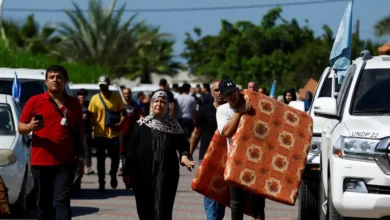Why did Judge Sebutinde vote against ICJ measures in Israel’s genocide case?

Judge Julia Sebutinde who voted against all the emergency measures that were introduced at the International Court of Justice (ICJ) on Friday reasoned that South Africa’s case did not sufficiently demonstrate that Israel’s acts had genocidal intent.
South Africa brought the case to the ICJ this month, asking it to grant emergency measures to halt the fighting, which has killed more than 26,000 Palestinians.
It accused Israel of genocide in its offensive that began after Hamas militants stormed from Gaza into Israel, killing 1,200 and kidnapping more than 240.
Sebutinde said that the dispute between Israel and Palestine is historically political or territorial and “I dare say, an ideological one.”
“It is not a legal dispute susceptible of judicial settlement by the Court,” the judge said in a statement issued alongside the Friday ruling.
The preconditions for the indication of provisional measures have not been met, she added.
“South Africa has not demonstrated, even on a prima facie basis, that the acts allegedly committed by Israel and of which the Applicant complains, were committed with the necessary genocidal intent, and that as a result, they are capable of falling within the scope of the Genocide Convention,” she added.
Prima facie is Latin for “at first view” to denote an initial examination.
“Similarly, since the acts allegedly committed by Israel were not accompanied by a genocidal intent, the Applicant has not demonstrated that the rights it asserts and for which it seeks protection through the indication of provisional measures are plausible under the Genocide Convention,” Sebutinde continued.
“The provisional measures indicated by the Court in this Order are not warranted,” she concluded.
In relation to the conflict between Israel and the people of Palestine, Sebutinde said the case being presented at the ICJ was “a desperate bid to force a case into the context of such a treaty, in order to foster its judicial settlement.”
“It calls not only for a diplomatic or negotiated settlement, but also for the implementation in good faith of all relevant Security Council resolutions by all parties concerned, with a view to finding a permanent solution whereby the Israeli and Palestinian peoples can peacefully coexist,” Sebutinde said.
“…the dispute or controversy is not a legal one calling for judicial settlement by the International Court of Justice,” she added.
Sebutinde said that a permanent solution to the conflict can only come from “good faith negotiations between Israeli and Palestinian representatives working towards the achievement of a just and sustainable two-state solution.”
Many social media users have spoken out against Sebutinde for her consistent votes against the provisionary measures.
The Ugandan ambassador to the United Nations Adonia Ayebare said that Sebtinde’s ruling did not reflect Uganda’s position of the Palestinian situation.
Taking to X, formerly Twitter, Ayebare said: “Justice Sebutinde ruling at the International Court of Justice does not represent the Government of Uganda’s position on the situation in Palestine. She has previously voted against Uganda’s case on DRC. Uganda’s support for the plight of the Palestinian people has been expressed through Uganda ‘s voting pattern at the United Nations.”
Sebutinde is one of two judges who voted against the six measures. Of the 17 judges on the panel, the other judge who voted mostly against the six emergency measures was the ad hoc Israeli judge, Aharon Barak.
Who is Judge Julia Sebutinde?
Sebutinde is a British-trained Ugandan judge who is also the first African woman to have a spot in the International Court of Justice. Currently in her second term after being re-elected in 2021, Sebutinde has been a member of the court since 2012.
From 2005 to 2011, Sebutinde was a Judge of the Special Court for Sierra Leone, reportedly handling several high-profile war crime and corruption trials.
She holds a Doctorate of Law, honoris causa, from the University of Edinburgh for distinguished service in the field of international justice and human rights achieved in 2009; a Master of Laws degree with distinction (LL.M.) also from the University of Edinburgh in 1990; and a Bachelor of Laws degree (LL.B.) from Makerere University in Uganda in 1977.
The judge was a Chancellor of the International Health Sciences University (IHSU) in Uganda between 2008 and 2011; a Goodwill Ambassador for the United Nations Population Fund (UNFPA) between 1996 and 2011; a member of the International Association of Women Judges (IAWJ) between 1996 and 2011; and more.
She is an author who has written academic papers, including one titled ‘International Criminal Justice: Balancing Competing Interests: The Challenges Facing Defence Counsel and Counsel for Victims and Witnesses.’











